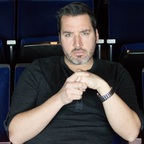 It was 4 years ago that I saw my first full Roulette at MadLab. There was something about Roulette 2012 that stuck with me. Peach with Chris Lane and David Thonnings, blew me away so I came back again for another night, and was transfixed by Slipping into Anarchy with Jim Azelvandre and Jennifer Feather Youngblood, so I came back for the final night and fell in love with MadLab due to But, Was it an Approved Death? With Vicki Andronis, and Jim Azelvandre again. In all fairness, I had been turning into a bit of a Lab-Rat already, having started hanging around several months prior and getting involved, but coming to Roulette inspired me to write my own short play. I mentioned my idea at the after Roulette cookout to a few people and got the standard. “Hey, sure. Let me know, I’ll look it over.” (I’ve since learned that a lot of people SAY they’re going to write a play, but never actually write one.) But, I did. And it was… Well, it was finished. I sent it off to a few people, got some notes, and some confusion, and set it aside. In 2013, I acted in Roulette, which was a thrill. I was excited to be part of Roulette, but I still had the desire to write for the show. I’d gotten a play selected for 3 in 30 and felt like I was getting better as a writer, so I went back to my first idea and re-wrote it 3 more times. The idea was great, the title was dynamite and at this point I’d seen enough great short plays to fix what didn’t work, and I took a writing class. I crossed my fingers, and submitted the play.
Now, the trick was to do it again. I’d been writing a lot of sketch comedy and was studying at Second City Chicago. I started looking through all my pieces and had a crazy idea: I’d submit a whole collection for the Playwright Spotlight Night! Ambitious? Yes. But, why wouldn’t I reach for the stars? What’s the worst that can happen, that I don’t get it? Well, I didn’t. And, since I put all my eggs in one basket, I was locked out of Roulette. I was going to be out of town, so I didn’t get to act in this one, either. This gave me the opportunity to enjoy watching and enjoying Roulette 2015, and it was great. But, still, that thing was licking at my brain saying “Write for next year.” But, I wasn’t sure what I wanted to say. I went back to Second City and studied Show Structure for creating a revue and talked to a couple friends that direct shows at Second City after watching their shows. I asked questions: “Why did you do this here?” and “Why did you put that in this slot.”. I went back to my collection, spent a couple weeks doing full re-writes and re-submitted it. It was leaner, more focused and I found a way to get my voice consistent and uniquely me over 60+ pages. images from ".., but it's not about that" by Erik Sternberger And It was selected! I jumped in the air. A lot. This time, I came to watch Stephen Woosley direct the amazing cast every night, and I loved it every time. Okay, I’ll be honest, the first time I was nervous for the first two of the six plays. Not because I didn’t trust MadLab, but because every person in the packed house was there because of “me”. I had visions of them thinking me too weird and waiting outside the door to hound me as I ran to my Ford Escape.
But, by the third play I was able to relax. The plays were landing how I hoped. Everyone was laughing and I felt like my kids were flying high and free and I didn’t need to hold the string anymore. You have until the October 1st deadline to submit and start (or continue) your own Roulette story. Check out the Theatre Roulette page under the Theatre tab for more information and submission guidelines.
1 Comment
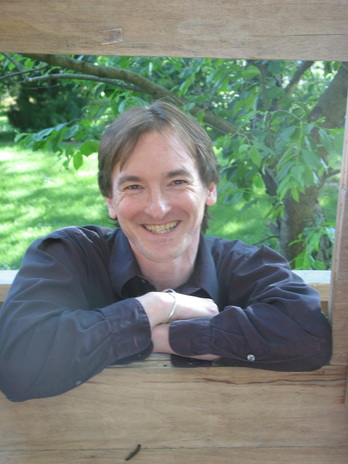 You know the guy from the movie Memento? Who could only keep memories for a few minutes before they evaporated, stranding him helpless amidst a maelstrom of confusing events? Well, that’s me trying to write a full-length play. Ten-minute plays—a cakewalk. Once I reach the last page of a ten-minute play, I can still dimly recall everything I wrote on the first page. I can remember the purpose which led a character to walk onstage and can double-check that he completed that purpose—or at least gave it his best shot—before granting him permission to walk off again. But if that character moseyed onstage two acts and 90 long minutes ago, I will be sitting there staring at him on the page thinking, “The name is familiar, but I just can’t place the face.” As you can imagine, this leads to some embarrassing inconsistencies in the early drafts of my full-lengths. “Chris, I could have sworn that character was described as an albino sword-swallower in scene 3. Are you certain you want him to be taking his vows for the convent in scene 8?” Well, I was certain, but now I guess I’ll check my notes. So I was always a little jealous of the Greek hero Argus. He had one hundred eyes that never closed. Because nothing ever evaded his gaze, the goddess Hera hired him to keep Zeus from getting his horny hands on a white heifer. (Zeus, the very first drunken fraternity brother.) If I had one hundred sleepless eyes, besides being a Visine hoarder, I might be able to successfully keep track of the relationships, motivations, secrets, and confessions of my cast of characters throughout the entire length of a full-length play. But I don’t, so I can’t. Few playwrights can. And that’s why Dionysius (when he and Zeus weren’t busy playing Wine Pong or paddling pledges) invented staged readings. A staged reading provides me with my own personal Argus: the audience. Their roving, restless eyes can spot all the inconsistencies and errors I’ve littered about my script. Have I described a character as a vegetarian in one scene only to have her emerge victorious from a hot dog eating contest in another? Argus the Audience will wildly wave their arms to alert me. Have I assigned three different names to a character’s childhood pet? Argus the Audience will shout out my error (along with their pick for favorite name). On my last visit to Columbus, MadLab was kind enough to provide a staged reading of Scritch Scritch. The feedback from the audience helped me to write a new draft that was not only less riddled with errors, but teeming with richer characters, sharper conflicts, and more fully realized moments. Without that theater full of people willing to donate their much-pressed time and attention to sitting through a rough read of an even rougher play, I could have never shaped Scritch Scritch into a play worthy of a full-scale production. I couldn’t have done it alone. Theater is at all points a community effort, even at that point where a playwright is sitting alone in a dark office staring at the latest draft of his play up on a glowing screen. Because he is not staring at it with just his own two eyes. He is staring at it with a hundred other eyes, lent to him by people who know about theater, who care about theater, who make theater possible. He stares at it with the eyes of Argus the Audience. P.S. Got two eyes to spare on Saturday, September 3, at 5pm? MadLab will be putting on a staged reading of my newest full-length, Playground Rules. Directed by Jim Azelvendre with a cast of Colleen Dunne, Stephen Woosley, Shana Kramer, and Melissa Bair, the play peeks in on a summer night full of swingers and swing sets, see saws and seduction, Gummi Bears and growing up. Pizza, drinks, and the playwright’s gratitude will be served up in abundance. P.P.S. Yes, I realize that Zeus eventually got his hands on that irresistible heifer by sending Hermes to lull Argos to sleep with a long-ass boring story and then slaying him with his sword. But I promise if you attend the staged reading, you will not be stabbed to death, even if my long-ass boring play puts you to sleep. P.P.P.S. But I can make no guarantees of safety for your white heifer. Best to leave it at home with Hera. As a dancer, over the years I’ve come to realize what the true job description of being an entertainer is. For one or two hours it is my job to get people to forget about their worries and their strife (cue “The Bear Necessities” from The Jungle Book!). I don’t get to hear their problems, but I have the pleasure of getting them to let go and bring them into another world where they may be at their best happiness. Basically this to me is the definition of a caretaker. Through my writing experience, I’ve come to understand that the term ‘caretaker’ for an artist goes much further than that. Your art is not just about taking care of your audiences’ cares and concerns, but it’s also about taking care of your own.
Before beginning my senior year of high school, I had made the decision that I wasn’t going to go to college directly out of high school. From getting a taste of what the professional dance world was like I came to the conclusion that it was something I want to do for a long time, or really for the rest of my life. Talking about it with friends, family and others who would ask about my “plans for the fall”, I would always do my best to give them the most confident, well-rounded response that I could possibly give, for I am and was very happy with my choice. However, there was a little part of me that was maybe a bit scared. I understood that chasing my dreams might at times be more of a challenge and maybe not as such an easier or safer route as going straight to college, but starting my final year that thought continued to rattle in my head at times. One day during my writing class Michelle Batt visited to talk about the Young Writers Short Play Festival. When I was making my school schedule the year before I had saw that there was a writing seminar being offered, so in an attempt to get out of gym and being that I’ve always had a love and appreciation for writing, I went ahead and signed up for the class (and was still put in gym, only one semester, but still!). I already had some knowledge of the Young Writers Festival from my junior year, but at the time just didn’t want to submit anything. When Michelle came to my class to talk about it I just kind of thought to myself ‘Well why not? It’s senior year, I’ll try everything!’ What I’ve discovered about who I am as a writer is I am very personal. My style, I’ve come to discover, is very vulnerable and revealing of who I am. I don’t think I ever intended for it to be that way, but it just happens and it’s nothing I can really control. It’s all very natural really. I can remember Michelle told us to “write something you care about”, so when I began writing the script I knew right away that I wanted to write about the decisions I’ve made on my future. Setting up the script felt simpler than I had anticipated. I just took a conversation I had with myself and basically split myself into two characters. Gave these characters backgrounds and names, turned the conversation into a plot, slapped on a title and Ba-Boom, a play was created! In reality it was built around a line that I had already thought of; what I wanted to say to all the naysayers out there really. Submitting it I honestly didn’t thought that it wasn’t going to get chosen as one of the lucky 10 plays to get produced. I believed in my work and what I had wrote, I’m just the type of guy that never gets their hopes up just in case things may fall through and not having to face even more disappointment. I will never forget it – the night of January 5th I was packing my bags to go live in Milwaukee by myself for a month because I had recently gotten into a professional dance company and had to leave to begin rehearsals right away. Then all of a sudden I get a call from Michelle saying “Hi, I’m Michelle Batt with MadLab Theatre and we want to produce your play with the 2016 Young Writers Festival”. When I went to go tell my parents they were actually completely flabbergasted because I guess I never told them I wrote a play and they were also dealing with sending off their 17 year old to live by himself for a month… so I guess I understood their shock. Going to the first read-through and seeing it come somewhat to life, I was honestly a little concerned. I felt like my show was in no comparison to any of the other shows, my story line was corny and predictable, lines were a mess – it’s safe to say I was somewhat stressed. It took me a few more attempts to finally come to a draft I was happy with, but with the help of the MadLab ensemble actors and my amazing mentor Jason Beehler, doing re-writes was actually very pleasing to me in ways I wouldn’t understand until I was doing them. My two very good friends Devante Brown and Lake Wilburn played the two characters. I’ve known Lake since I was eight, my freshmen year I went to the same school as both of them at Centennial HS before switching to Fort Hayes HS and developed a stronger relationship with Devante, and also was given the privilege to choreograph Centennial’s musicals in my junior and senior years and was honored to work with both of them, Devante for both years. Our first rehearsal together with director Jim Azelvandre was so thrilling to me, and to have the characters be played by two of very close friends of mine whom I adore made this experience that much more amazing. All in all, what I’ve learned through this experience with MadLab is that my art, my piece, truly is my own personal care. Hearing it, and seeing it performed and put on I’ve realized that writing it was really my clarity with the whole situation. I never knew how somewhat insecure I was about my decision until I actually sat down and wrote it out for others to hear and see being enacted. Artists truly are caretakers, and the beautiful thing about art is we get to learn how to take care of ourselves. I don’t know what all the future has in store, but I’m excited more than ever to see it unfold, and you can believe there is going to be a lot of writing involved with it. I really just have MadLab to thank for that. 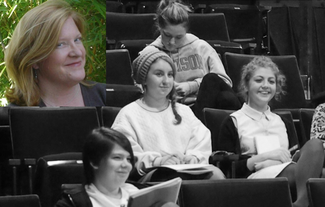 MadLab's Young Writers Talk About Playwriting and Being a Woman in the Theater World. This year marks the fifth year of MadLab Theatre’s Young Writers Short Play Festival. Young Writers participants Maddie Conley and Hannah Woods talked to 2017 (and 2012) MadLab playwright Tira Palmquist about being a female in the theater world and about their experiences in the Young Writers program. Maddie Conley and Hannah Woods: What made you want to start writing plays? Tira Palmquist: Before I was a playwright, I was an actor. I also used to be a poet. I have always loved writing, and writing poetry was challenging and satisfying as a means of self expression, but limited in terms of the kinds of issues, stories, themes and ideas I wanted to write about. The transition from writing poetry to writing plays was a relatively easy transition, though, because of my background and training in theater. MC and HW: How long have you known about MadLab? TP: When I lived in Columbus back in the 90s, I started working in the theater, and I knew several of the original MadLab folks. I recall their wild Bacchai, which I loved. I've always admired their dedication to new plays and playwrights. I answered a call for scripts a few years ago, and they selected my play Age of Bees for their 2012 season (directed by Jim Azelvandre. I also wrote a short play (Edward Snowden Died for Our Sins) for a 3 in 30 show in 2013. MC and HW: What advice do you have for female young writers? TP: First, keep writing. A lot of girls give up because of the stupid and awful resistance they'll get from people who don't take these girls seriously, or who don't value the stories they have to tell. Second, tell your stories! Tell the stories that you must tell, the stories that, without which, your life would mean less, be less. Third, surround yourself with people who get what you're doing, and who value that. I don't mean that you should surround yourself with people who love you and love everything you're doing: I mean that you should find people who inspire you to write better, write more, write harder who inspire you to improve and grow and change and evolve. MC and HW: Why is it important to have female voices in theatre? TP: Well, we're half the population! But seriously: If we shut off any voice, we become smaller. What did it feel like to see your play come alive? MC: It was magical. It was like going to DisneyLand for the first time, almost. It was surreal. There's nothing like being able to mouth the lines along with actors, you know? HW: I remember sinking back into my seat in a blend of shame and pride. There was a little bit of they are saying the words I made up mixed with why would I write that. TP: Can you describe your experience with the Young Writers project at MadLab? MC: Young Writers was one of the best experiences of my life. From the first moment I stepped inside the theater, I felt welcomed, believed in, and understood. I learned so much from the entire process, from editing and balancing my script to the audition process and how a show comes to life onstage. I bonded really closely with my fellow writers, and I made friends who I know will be friends for life. There is no opportunity for high school writers that can match the Young Writer's Festival. Getting involved with this project could honestly change your life. It changed mine. HW: The Young Writers Short Play Festival is truly a once in a lifetime experience. As soon as I stepped into MadLab I realized that this was a place filled with people who cared about what young people had to say and cared about amplifying the voices that others don't hear. MadLab truly values a collaborative spirit and the process of building great shows together. Anyone who has ever had a fleeting thought about writing a play should experience how much their creative ability will be stretched and strengthened by this program. TP: What's next for you (in the world of theater)? MC: Who knows! I hope to keep writing, learning, and lurking around MadLab until they kick me out. HW: I have no idea! But I know that I'll keep writing and hanging around MadLab until they make me sweep the lobby or something. |
Archives
December 2020
Categories
All
|

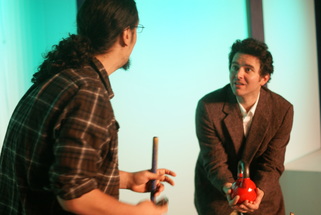



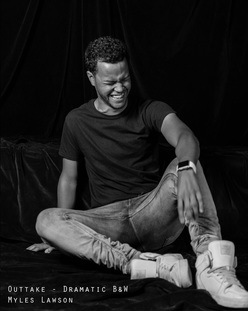
 RSS Feed
RSS Feed





